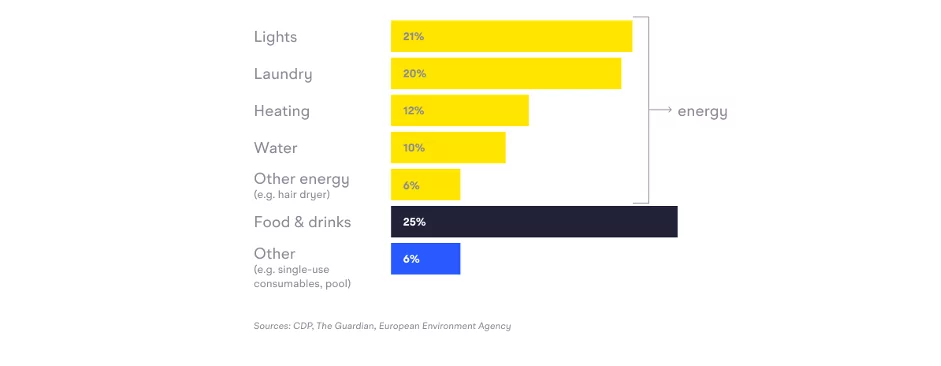
As individuals, we all want to do our part to protect the environment and reduce our carbon footprint. Everything you do, from your morning coffee, to the rowing machine at the gym, contributes to your carbon footprint. However, not everything is equal and we can choose to make better decisions when we’ve got the right information. In the same way there was a time when nutritional data couldn’t be found on food packaging, we think it’s time we asked for the same transparency with carbon.
At Staze we’re working to make a future with carbon transparency a reality
Did you know even staying in a hotel creates a carbon footprint? In fact, just one night in a hotel can have the same carbon footprint as a week at home.
The average carbon footprint of a 1 night hotel stay is 40kg CO2*
But some hotels are better than others. This is important because the data shows that more sustainable hotels can have a carbon footprint over 80 times smaller than other hotels in the same city, here’s an example for three 4* hotels in central London:

Staze acts as an independent voice on the actual carbon footprint of hotel bookings. The Greenhouse Gas Protocol is the official source of advice on calculating the carbon footprints of different activities. We have built on their methodology to calculate individual hotel emission factors instead of one single average for all hotels.
*That’s equivalent to driving 142 km in an average petrol car.
70% of the carbon footprint of a hotel stay comes from energy usage
The biggest contributor to the carbon footprint of your stay in a hotel is the energy that is used, from the lights and air conditioning in your room, to the energy used to wash your sheets and heat your shower.

This means the two most important factors for calculating the overall carbon footprint of a hotel are:
- How much energy they use, and
- The type of energy they use
Using energy from low-carbon renewable sources is a step in the right direction, but if this represents a small proportion of the total energy usage then it won’t significantly reduce the carbon footprint of your stay.
There are many other factors that impact the total energy a hotel uses, from building design to behavioural nudges, but the energy data is the ultimate indicator of how well a hotel is actually managing to reduce the carbon footprint of each guest’s stay.
You can reduce the carbon footprint of your stay by up to 75%
To reduce the carbon footprint of your hotel stays, choose to book hotels with lower energy emissions. Staze is a hotel booking platform that enables you to compare carbon emissions just like you compare prices. By calculating the carbon footprint of hotels, Staze helps you make an informed decision when choosing your accommodation. Not only will you be reducing your carbon footprint, but you’ll also be supporting hotels that are committed to sustainability.
Staying in a hotel does have a carbon footprint, but by choosing hotels with lower energy emissions, we can all do our part to reduce our impact on the environment.
Reference: Why does staying in a hotel have a carbon footprint?






